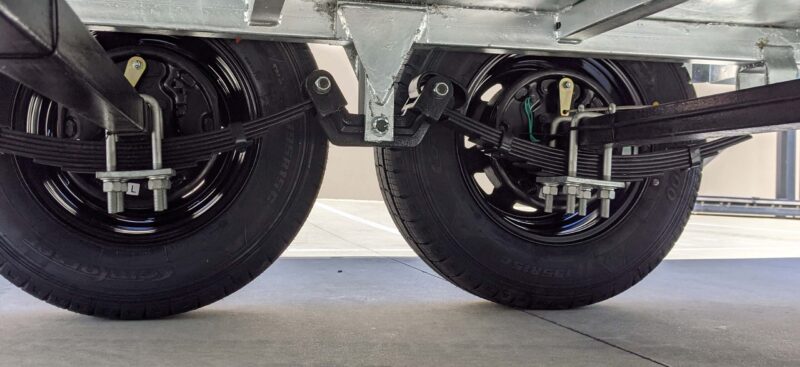One of the weight factors that many new travel trailer owners forget about is tongue weight (or TW). When you reduce the tongue weight on your travel trailer to its optimal level, it increases your towing safety and fuel efficiency.
It’s also one of the most adjustable towing weights. Travel trailer towing becomes easier and more enjoyable when the tongue weight is properly set.
Towable RVers must consider various trailer and vehicle factors to reduce the tongue weight on their travel trailer. This article will provide a wealth of information on reducing tongue weight on your travel trailer. Most importantly, we’ll share how adjusting tongue weight can impact travel safety and vehicle performance.
What Is the Tongue Weight on Your Travel Trailer?
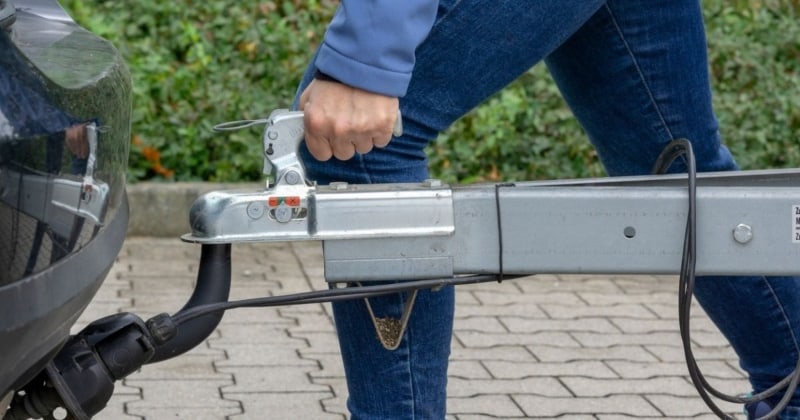
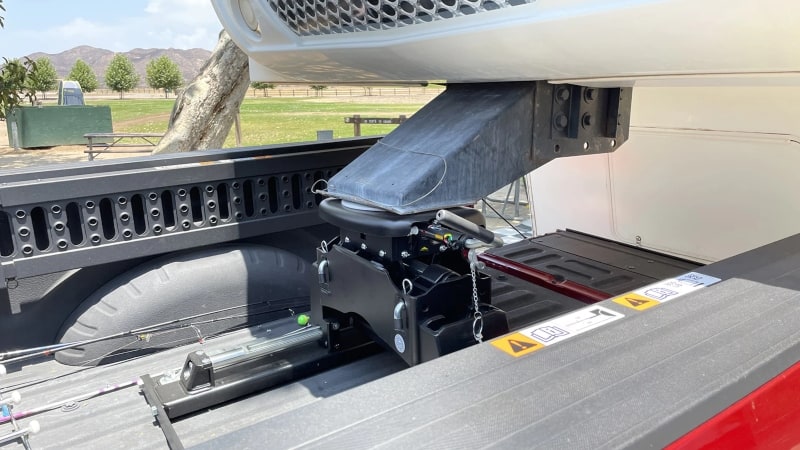
Before we get into what tongue weight is, it’s helpful to know what part of your travel trailer the tongue. The tongue is the portion of the RV that connects to your vehicle. It’s also known as the hitch.
Each travel trailer has a tongue that looks a bit different, but they all function to provide a secure connection to your truck or SUV.
Gross Tongue Weight Rating (GTWR) is the maximum amount of weight that can be applied to the trailer hitch before impacting the stability of the trailer and vehicle.
3 Ways Tongue Weight Impacts Your Travel Trailer

Tongue weight is one of the most important considerations when you’re pulling a camper. It’s also often an overlooked factor. Improper tongue weight can significantly impact your trailer, vehicle, and safety.
1. Reduce Your Tongue Weight on Your Travel Trailer For Safety
Safety is probably the most important consideration for proper tongue weight. When your RV tongue weight is either too light or too heavy, it becomes unsafe to pull your trailer.
Overloading your trailer’s tongue can limit braking, steering, and trailer sway. All of these can cause dangerous towing conditions for both you and other vehicles.
2. Prevent Damage When You Reduce the Tongue Weight on Your Travel Trailer
Since the tongue is your connection point to your vehicle, proper tongue weight protects against damage. Too much weight can stress your truck’s suspension, tires, and frame. Not enough weight can cause the RV to slip off the ball. This can damage both your trailer and your vehicle.
3. Reduce the Tongue Weight On Your Travel Trailer For Better Control
Along with safety, it’s important to understand that tongue weight directly impacts your ability to control your vehicle and trailer. When towing, if your tongue weight is too light, the trailer can sway, making it very difficult to maintain control of the trailer.
If the tongue weight is too heavy, you’ll find it very difficult to steer your vehicle. Turning corners or going around curves can be particularly challenging with too much tongue weight.
Can Tongue Weight Be Adjusted?

Now that you know why tongue weight is so important, you’ll be happy to know that tongue weight is adjustable. Here are 5 ways to easily adjust the weight on your RV’s tongue.
5 Steps to Reduce Tongue Weight on a Travel Trailer
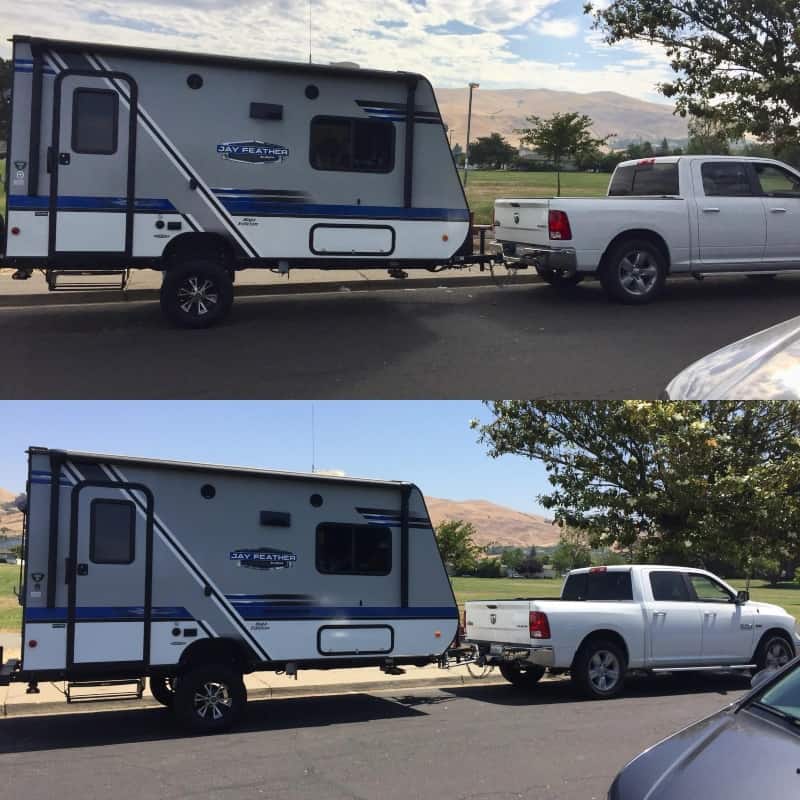
1. Measure the Tongue Weight First
Knowing how much your travel trailer tongue weight is, is the first step in reducing tongue weight. For smaller campers, you can use a basic bathroom scale. For larger RVs, you can use a trailer tongue weight scale. If you aren’t up for that, you’ll have to use a weigh station or public scale.
2. Know the Trailer’s Gross Vehicle Weight Rating (GVWR) Capacity
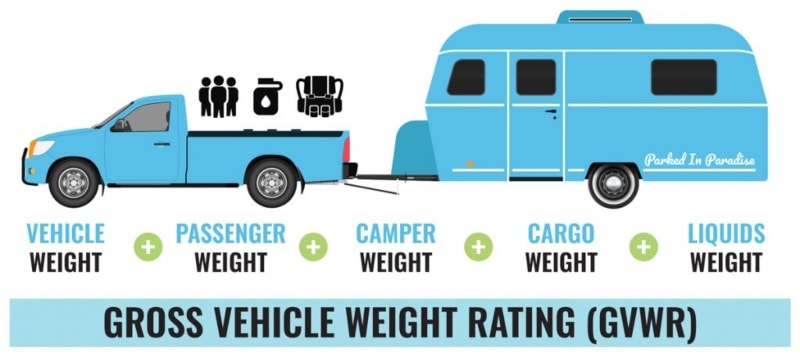
The GVWR is the maximum amount of weight your travel trailer can safely hold with people, gear, food, equipment, and pets. This value is necessary for calculating the tongue weight of your camper.
If you’re unfamiliar with the RV weight terminology, here’s a great chart and explanation to use.
3. Follow the “3/5 Goes in Front” Rule
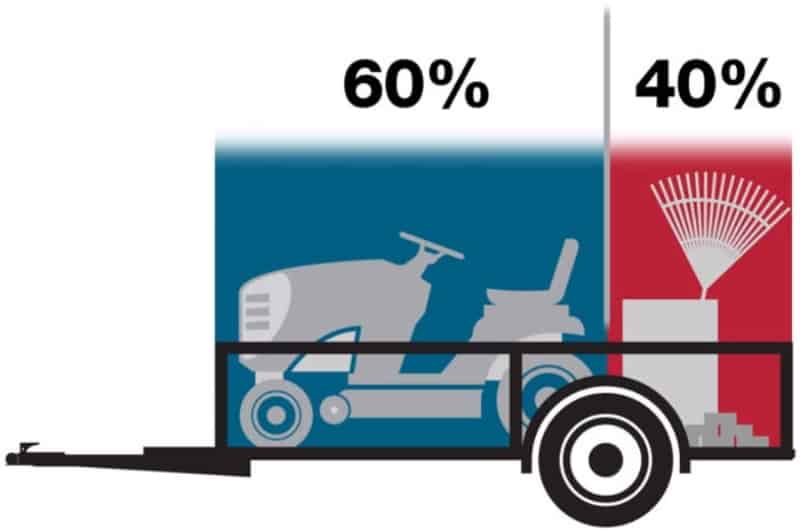
Balancing the weight distribution around your trailer’s axle makes a big difference in tongue weight. For ideal weight distribution, 3/5 or 60% of your cargo weight should be placed in front of the axle.
4. Change the Hitch Ball Height
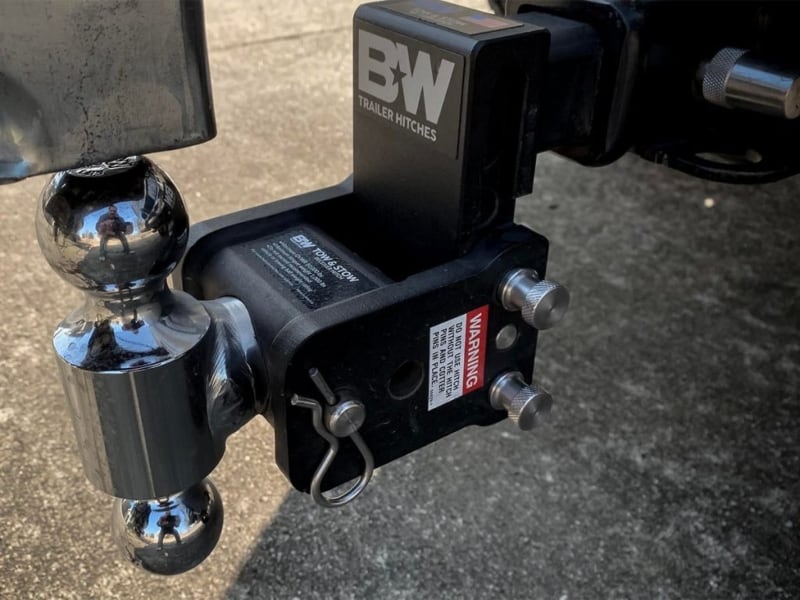
A properly leveled trailer will reduce the force placed on the vehicle hitch. If your hitch ball is too high or too low, this can impact the tongue weight. Using an adjustable height ball hitch, like the B & W T10048 Tow & Stow Adjustable Trailer Hitch, can help with proper tongue weight.
5. Use Sway Accessories
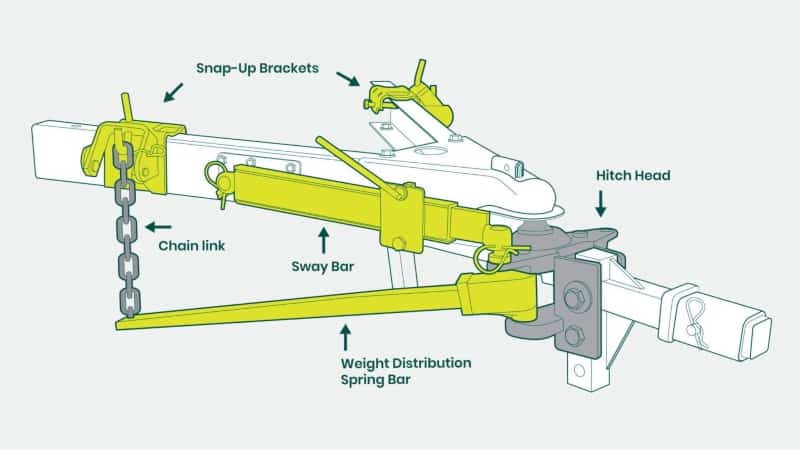
Sway accessories should never be used as an alternative to proper tongue weight. However, they’re a nice added safety feature. Sway accessories will keep your trailer from erratically swaying when traveling at higher speeds. Sway accessories are great safety features and are handy even for small travel trailers.
How Much Weight Should Be on a Trailer Tongue?
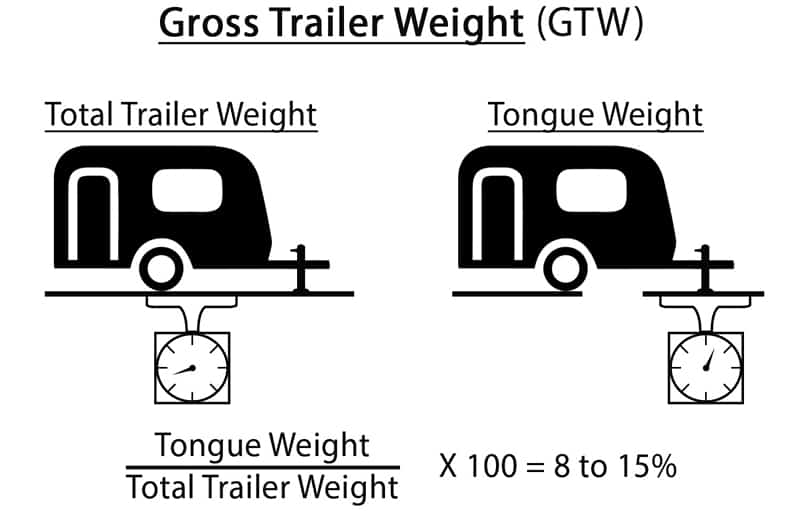
In general, tongue weight should be between 10% and 15% of the gross towing weight (GTW) for your ball-mounted hitch trailer. For instance, if your trailer’s GTW is 2,000 pounds, the tongue weight will be between 200 and 300 pounds.
If you really want to get this weight correct, include the weight of your cargo in the calculations for a more accurate idea of the tongue weight.
Remember, your tongue weight is greater if you have a gooseneck or fifth wheel trailer. The ideal tongue weight for these camper types is between 15% and 30% of the GTW.
What Happens If You Have Too Much Tongue Weight?

Your ability to steer your vehicle is the most significant impact if your tongue weight is too heavy. Combining that with a much slower stopping time and overloading your trailer’s tongue can be quite dangerous.
Besides safety, too much weight on the tongue can also impact driving performance. It can also increase wear and tear on your vehicle tires, suspension, brakes, and transmission.
What Happens If My Tongue Weight Is Too Light?
Trailer sway is the most significant problem caused by too little tongue weight. When your trailer sways precariously when towed, you risk inadvertently disconnecting the trailer from your vehicle while traveling. Sway is dangerous for you and other drivers. It can also result in significant damage to your vehicle and camper.
3 Factors That Impact Tongue Weight
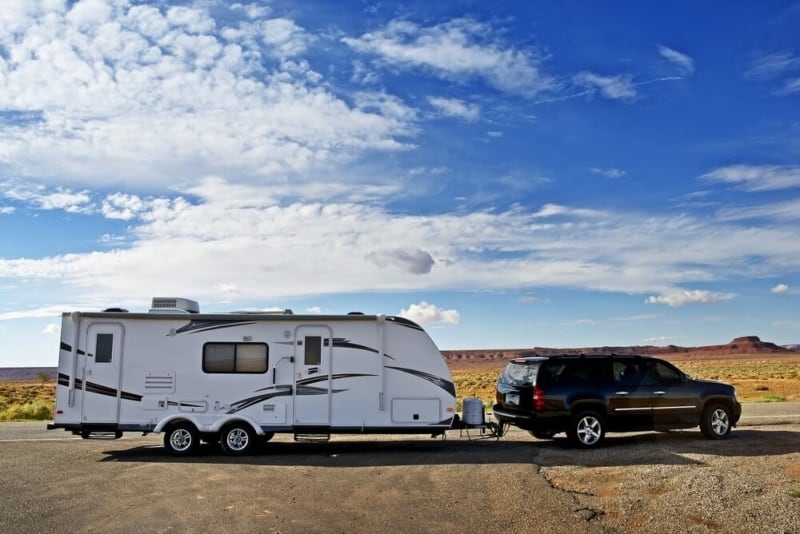
1. The Payload
When discussing the payload for your camper, we consider quantity and placement. Knowing your RV’s GTW is essential, so you don’t overload your trailer. Then remember to distribute your gear inside your trailer properly. Sixty percent of your trailer weight should be in front of the trailer’s axle.
2. The Tongue
The shape, length, height, and weight of your RV’s tongue will change the tongue weight for your trailer. Remember that tongue weight is the force placed on your vehicle’s hitch. Changing the dimensions of the tongue will change how this force is exerted on your vehicle.
3. Trailer Axle Positioning
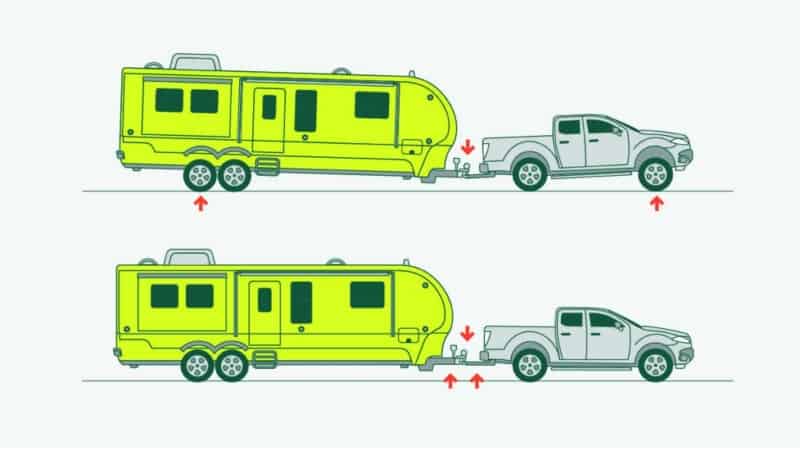
Most travel trailers are a kind of lever. The axle is the fulcrum of the lever. The point where the axle is placed will change how weight is distributed through the trailer. It’ll also change how you load gear into your trailer.
FAQs About Reducing Tongue Weight on a Travel Trailer
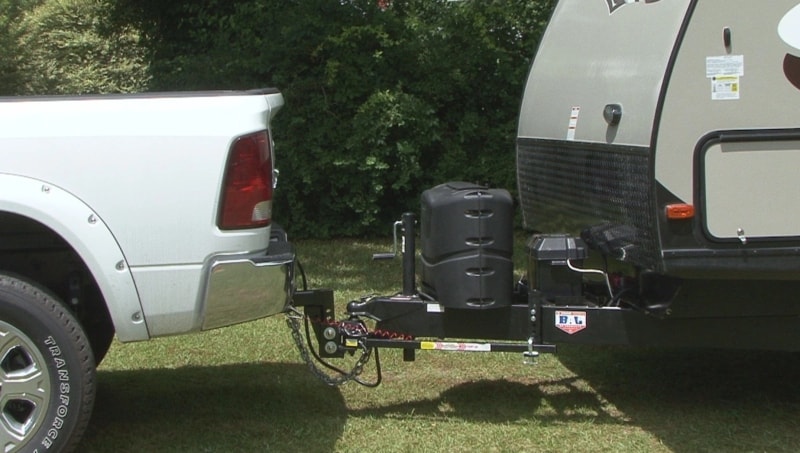
Will a Weight Distribution Hitch Reduce Tongue Weight on a Travel Trailer?
The easy answer to this question is no. A weight distribution hitch does not reduce tongue weight. This type of hitch changes how the weight is distributed on the tow vehicle. More weight is passed to your vehicle’s front axle, allowing for a more level driving condition.
Does Hitch Height Affect Tongue Weight?
Yes, height hitch does affect tongue weight. Think again about our lever and fulcrum. If your vehicle’s connection point is too high, the tongue weight will be less. If the hitch on your vehicle is too low, it will increase the tongue weight.
How Does a Hitch Extender Affect Tongue Weight?
If you’ve done all the right things and still need to reduce tongue weight, a hitch extender can help. Depending on the length of the extender, using a hitch extender can reduce your tongue weight by up to 50%.
When Do You Need a Weight Distribution Hitch?
There are indicators that will tell you that you need a weight distribution hitch:
- Your trailer weighs more than 50% of your vehicle weight.
- You notice your vehicle’s headlights point upward when towing.
- The back of your truck is visibly lower when your camper is attached.
- You experience sway when pulling your RV.
- It is difficult to steer your vehicle.
- Your stopping time and distance increase significantly.
Is It Okay to Use a Hitch Adapter?
Using a hitch adapter is not a great idea for larger-size travel trailers. However, a hitch adapter for smaller trailers can help reduce tongue weight and provide a clearer view of your camper.
It is also valuable to note that hitch adapters do create a “weak” point when towing. Besides not being as strong, this junction can also cause sway if the adapter doesn’t fit well.
What Is the Proper Tongue Weight?
Proper tongue weight is a calculated value based on the gross weight of your trailer. The gross weight of your trailer includes the trailer and all the passengers and gear. The proper tongue weight for ball-hitch mounted trailers is between 10% and 15% of the gross trailer weight. For 5th wheel and gooseneck trailers, the proper tongue weight is between 15% and 35% of the gross trailer weight.
Additionally, most travel trailer manufacturers will provide a range of tongue weights that are ideal for their travel trailer based on the trailer’s dry weight and the GVWR with the maximum payload weight (a.k.a. Cargo Carrying Capacity or CCC).
Final Thoughts on Reducing Tongue Weight on a Travel Trailer

Proper tongue weight is important in the safe towing of your travel trailer. Fortunately, to reduce tongue weight, travel trailer owners must make a few adjustments to their camper and vehicle.
In many cases, the best solution is to redistribute your gear inside your trailer. No matter the size or style of the camper, proper tongue weight is essential for a fun and safe travel experience.
About the Author:
Jason Gass is a full-time freelance writer and part-time RVer whose goal is to share great stories around a campfire with good friends.
When he’s not working, he spends most of his time camping, searching for the best breweries, and road-tripping in his teardrop trailer with his wife, daughter, and two dogs.



